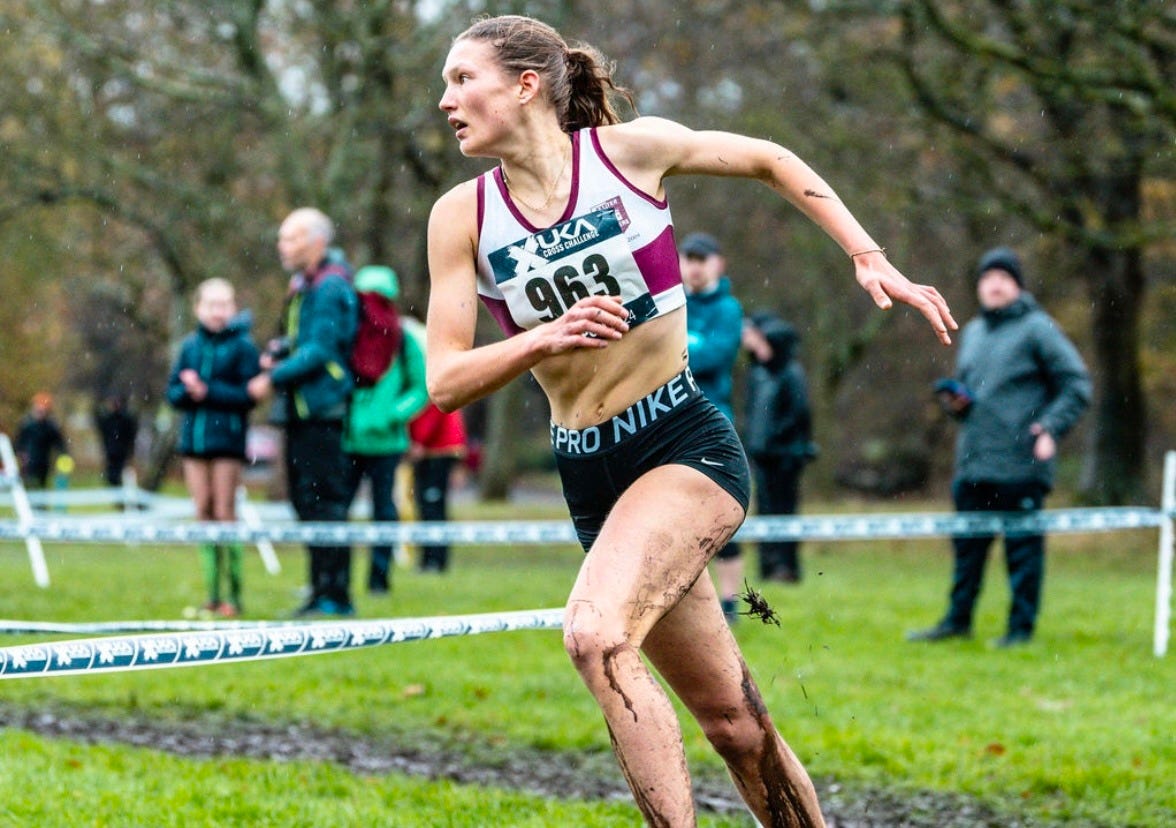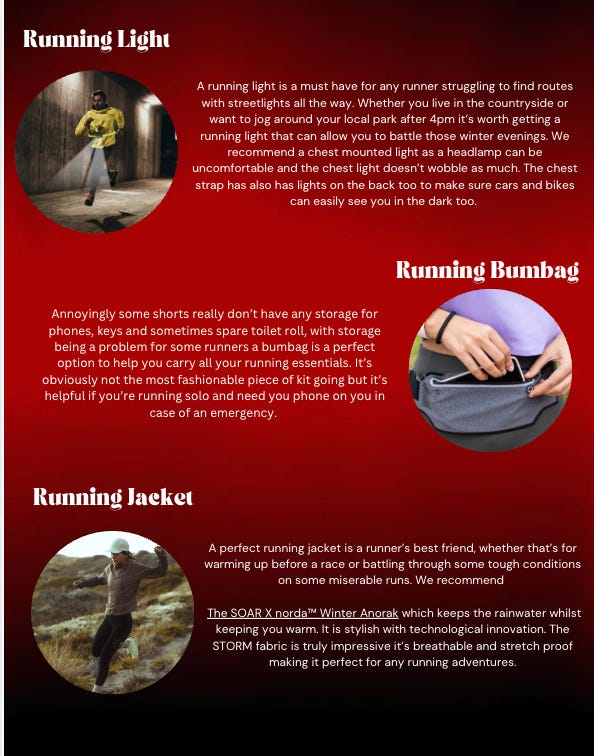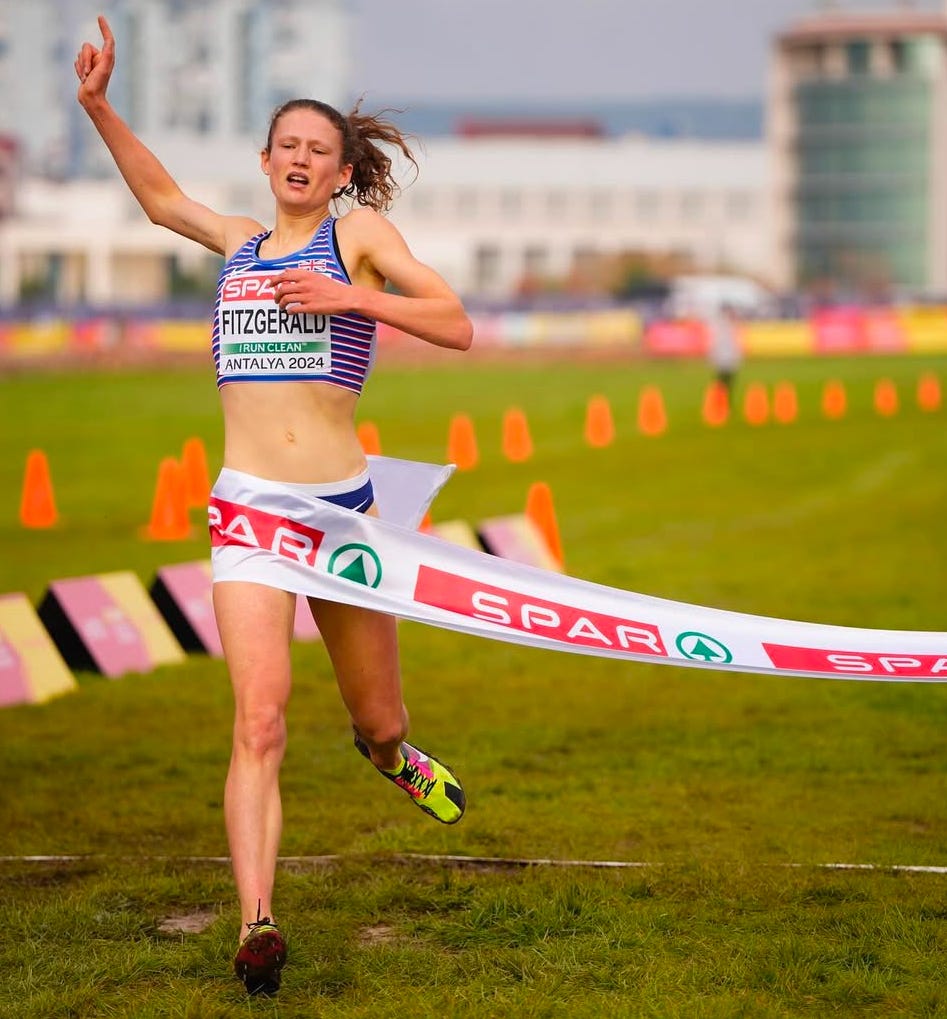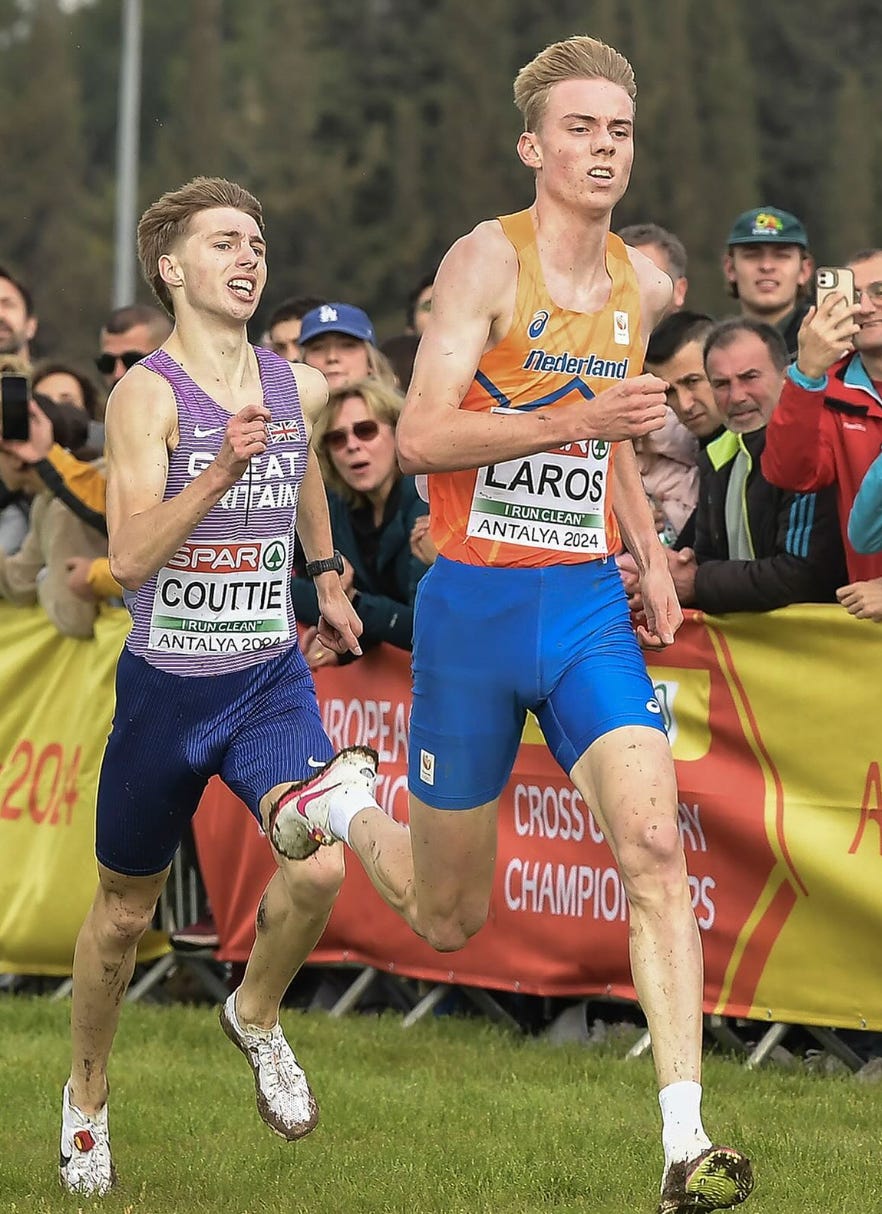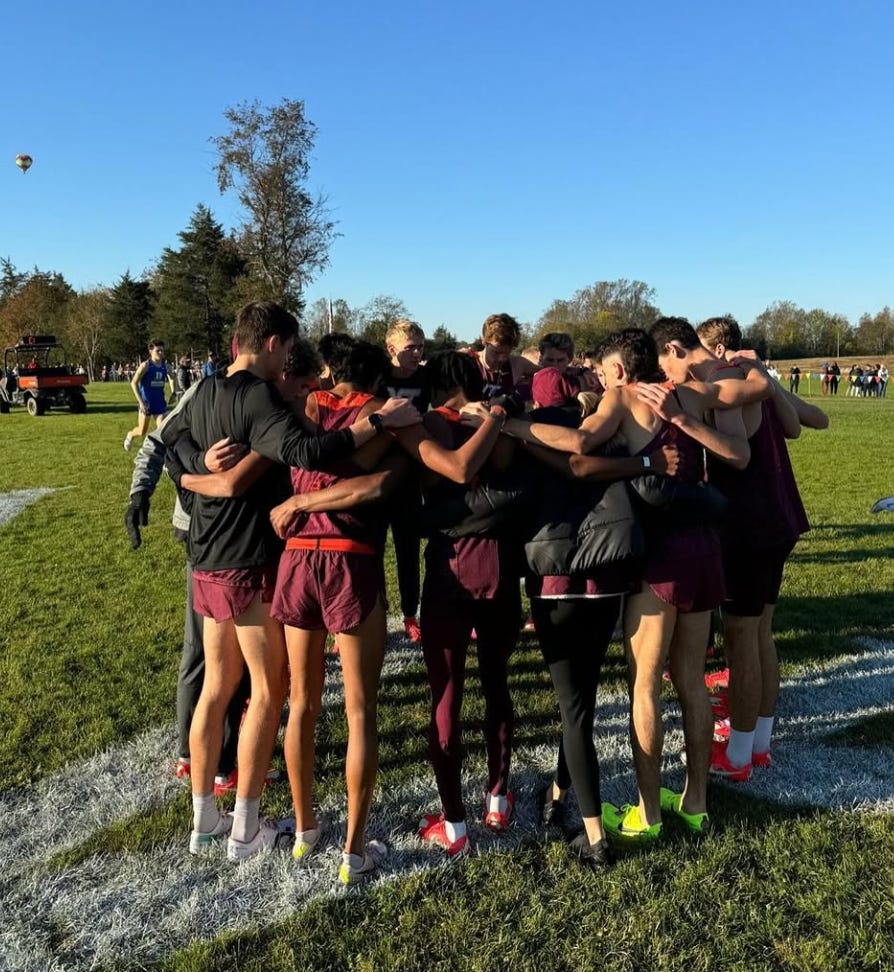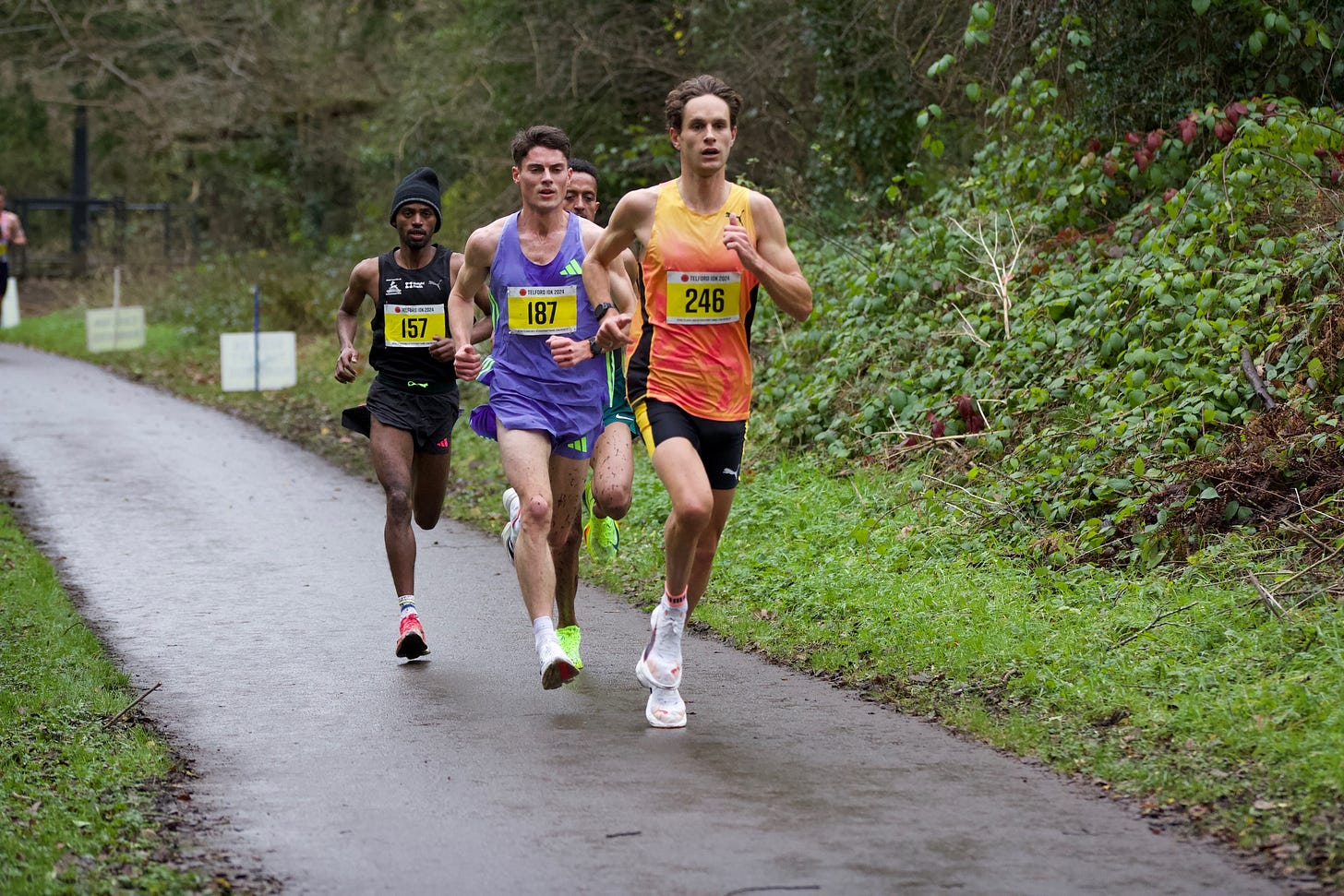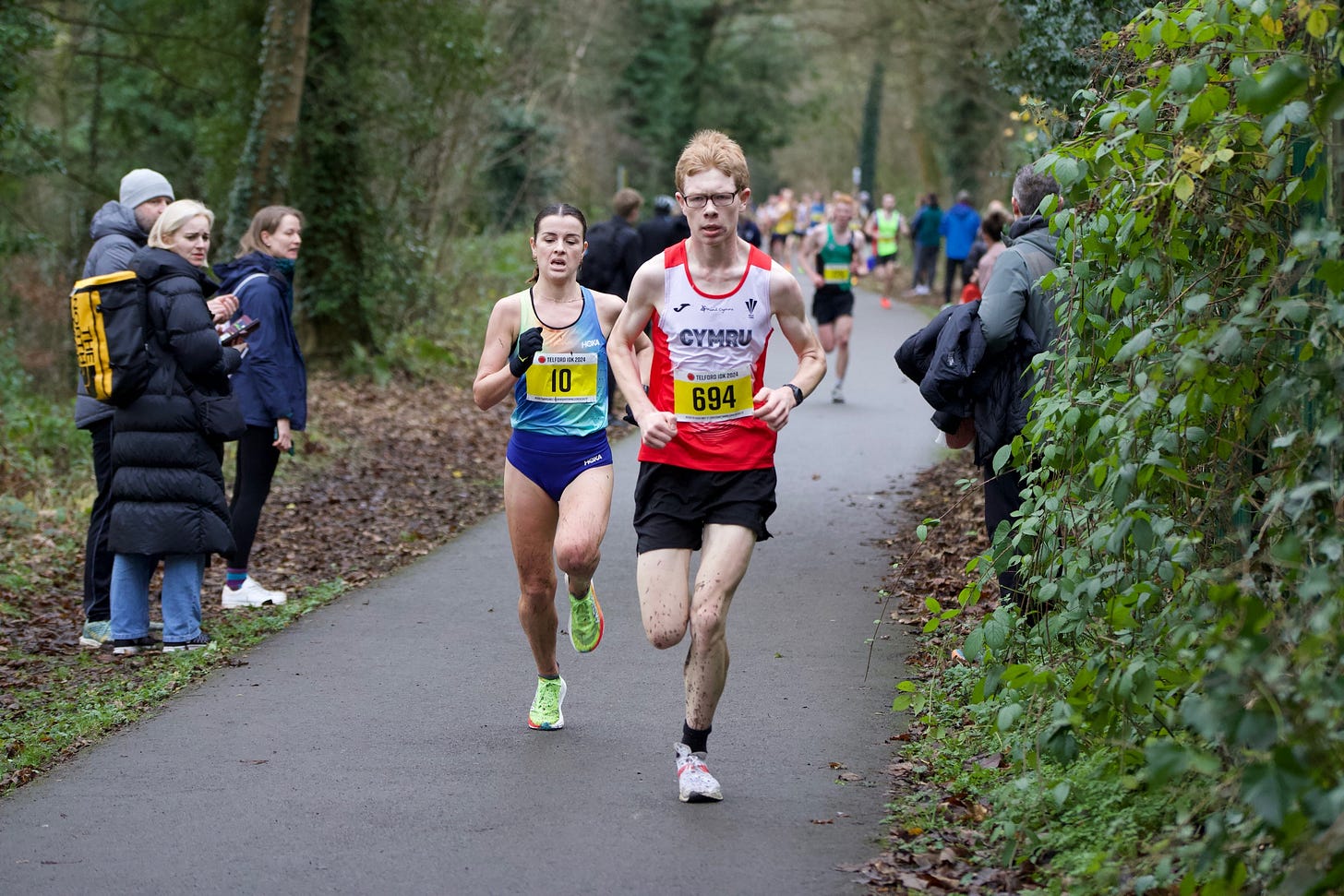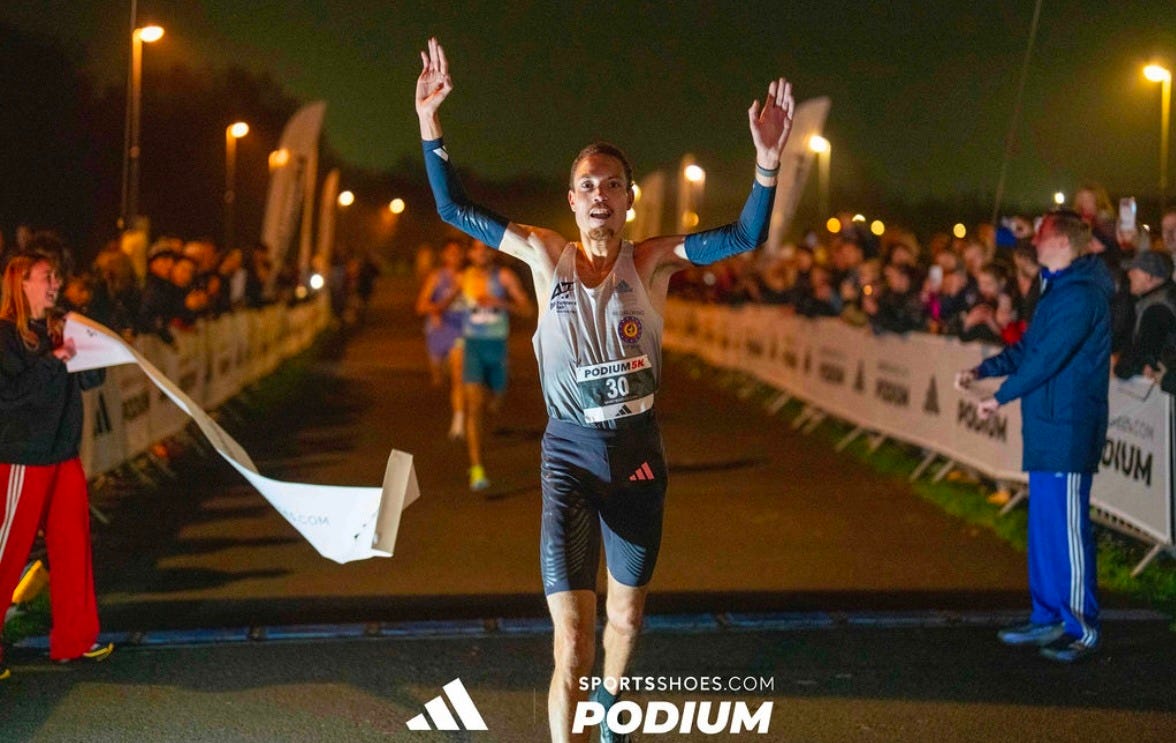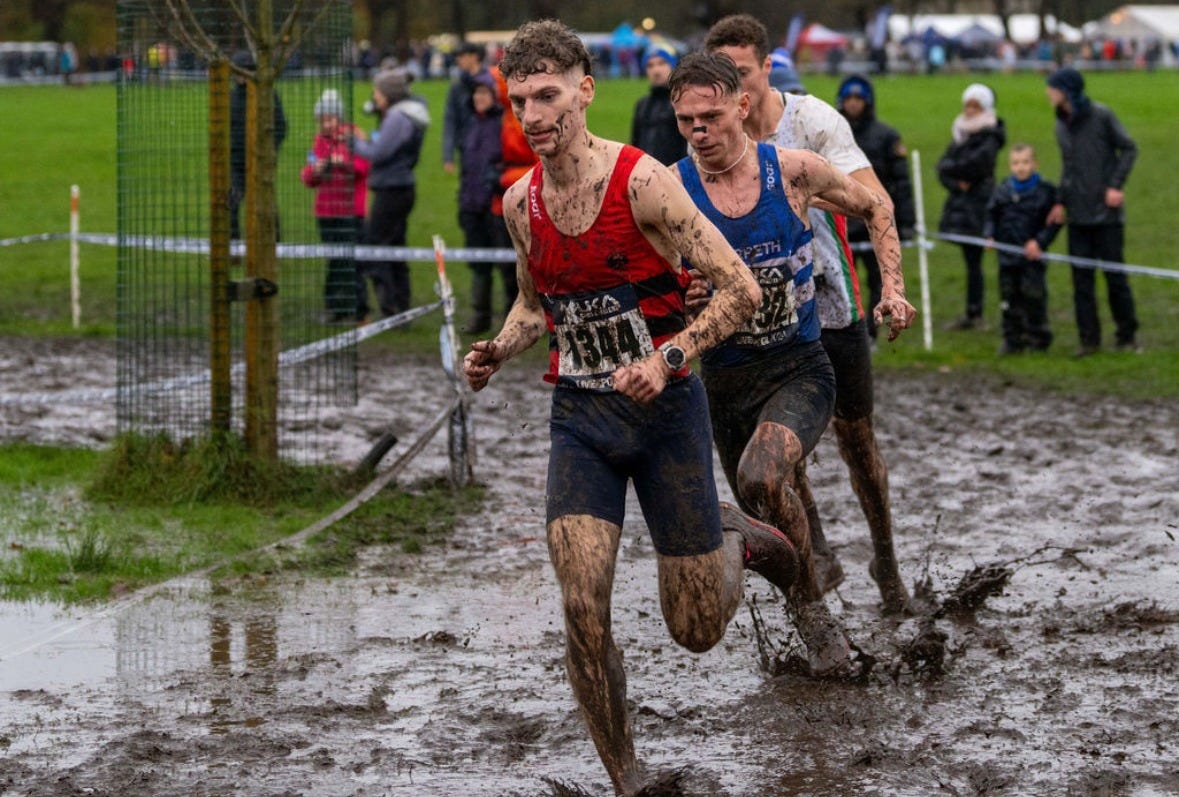On Your Marks: British Rising Stars
Issue 5 of the On Your Marks newsletter brings you exclusive interviews with British Rising Stars Innes Fitzgerald and George Couttie after the European Cross-Country Championships.
Unstoppable: Innes FitzGerald and her meteoric rise
After winning back-to-back European U20 Golds we caught up with Innes to discover her secret to success
As athletics fans, we have had the privilege of becoming accustomed to seeing the familiar figure of Innes FitzGerald leading the way at various races across Europe. Most recently, despite pressure and expectation, the under 20 added another European title to her CV.
Despite having taken part, as so many do, in her local cross-countries during primary school, it wasn’t until much later that Innes discovered her love and ability for running.
“I didn’t really do much sport in the early years, like year seven and year eight because I wasn’t really that sporty. I wanted to be cool, and sport wasn’t cool, so I just didn’t do it. And then, yeah, during lockdown I started running a bit because my sister was running a couple of days a week just to keep fit so I was just like ‘well, I’ll go if you go’.
“And then, I kind of ran more and more. I ended up running about four days a week during lockdown and then I came back to school. Everyone was quite unfit after the lockdown – well that’s what all the teachers thought. So, we started doing this thing where we would do 10 minutes of running at the start of every lesson. Everyone thought it was horrible, but I found it okay. Then my teachers were like, ‘you need to get down to a club.”
Because of logistics, it wasn’t always possible for Innes to get down to the local track. Luckily, this didn’t stop her pursuing the sport, and her local Parkrun came to the rescue.
“Eventually, after doing a few Parkruns and stuff I met Gavin and Jo Pavey who are now my coaches, and they were like ‘yeah we need to get you down to a club,’ which was good. Part of me thinks if I’d rushed into it earlier, I wouldn’t have liked it in the same way whereas now I really appreciate going to the track and that’s one of the things I look forward to during the week.
“So, now I’m training with Gavin and Jo, and go to the track twice a week. Because now I’m at Exeter Uni it’s all quite easy because it’s literally just two minutes down the road, and my coaches are there, and the squad is nice. Most of them are slightly younger guys and a few girls in their as well. It’s a good atmosphere.
The set up certainly works, and after deciding there was no need to move away for university, Innes has grown into her athletics career. Her performance at this European Cross-Country epitomises it, as she managed the pressure of being reigning champion.
European Cross-Country Championships
“Going into last year’s [European Cross-Country] I didn’t really feel the pressure. I knew there was expectation on me, because I was one of the favourites, but I didn’t feel pressure in the same way because the year before I’d come fourth and I was really devasted with that. I knew I wanted to perform better than fourth basically but I kind of went into it blind.
“I went into last year’s race with a lot of confidence thinking that I could run well but I didn’t really know who else was in the race. Whereas this year, I was quite nervous going into the race.
“I felt there was a lot of expectation and pressure on me because I won last year and because of what I’ve done on the track and things like that. But it was privileged to have that pressure, and I think it actually benefited me in some ways. It helped me stay focused on the race, and to concentrate at the job that I needed to do.
“I went into this year with confidence that I could do it again, but it was just about going about it the right way. Just controlling the race and not going out too fast basically.”
“I love the mud, and I think I’ve come to realise that after Liverpool this year. I finished that race and was like ‘that was the most fun I’ve had’. And because Brussels last year was really muddy, but I had to go into this year more cautious.
Handling the pressure
“We had a chat with my coach to be slightly more cautious because when its flatter and dry I’m not always as good. So, we played it a bit safer.
“Last year the atmosphere was very good because there was a lot of Brits there because Brussels is so close. I would say this year there was slightly less spectator support, but because of the way the course was, like they do them in close proximity, there are always spectators everywhere. So you always had people shouting, whether it’s for you or not. You learn to take the support even if its for somebody else and it boosts you a bit.”
As any top athlete will tell you, your performance is about controlling the controllables. International competition can bring lots of unknowns that can impact race day.
“Sometimes it’s quite hard to find anything about the international athletes. They don’t have Power of 10, you can look on the World Athletics website but it’s kind of confusing. But you don’t want to get caught up in what someone else is doing. They might not run like that; they might have a PB 10 seconds faster but on the day, they might not have a good day.
“My coach does a bit [checks the start lists], and sometimes he’ll mention people’s names if he thinks that maybe they might run the race a certain way or use a certain tactic or I need to watch out for them or not go with them, but I don’t tend to look at it because it can stress me out and then I can start doubting myself.”
Thrills, Spills and Man-Made Hills: European Cross-Country Championships
So much has been geared towards the European Cross-Country Championships. It has been built up for what feels like forever. On December 8th, 2024, we were finally treated to the 30th edition of the iconic annual fixture.
The course in Antalya looked a little different to what we’re used to on the domestic scene. In the UK, we’re more than accustomed to cold, damp grass that’s swimming below a sea of mud, as athletes ‘cruise’ around a couple of long laps. Instead, Antalya and Liverpool seemed worlds apart. The technicality of man-made obstacles and hills, patches of sand, and numerous shorter laps full of twists and turns meant no chance for athletes to switch their brains off and click into cruise-control. Despite the stark contrast from the classic club tents, the Great Britain squad came out victorious, topping the medal table once again.
Under 20 Women - 4.8km
The day began with the U20 women. Undoubtedly, pressure and expectation was on defending champion, Innes FitzGerald to retain her crown. She did just that.
It’s easy to forget FitzGerald is just an U20, as the junior handled the pressure seamlessly. Stretching down the long home straight, a few glances back suggested FitzGerald had left everything on the course but an 11 second lead meant she had nothing to fear.
As FitzGerald defended her gold, Jess Bailey claimed silver and helped put Great Britain in pole position for the team prize. An impressive 9 points across the team meant a comfortable win, as the team silver went to France with 39 points.
Sofia Thøgersen claimed the individual bronze for Denmark, five seconds behind Bailey after a strong sprint saw her pip Germany’s Julia Ehrle on the line.
Under 20 Men - 4.8km
Next up were the U20 men. It was Norway that claimed the team prize in this race with 17 points, but the contest was much closer. Just three points behind them, the Netherlands took team silver - helped by their U20 champion, Niels Laros.
Laros has been something of a rising star over the last 12 months. A breakthrough track season for the youngster saw him finish sixth in a stacked 1500m Olympic final, and a strong run in Antalya meant he was able to round off superb 2024 with a European gold, upgrading his silver from the year before.
Despite no team medal for GB in the U20 men, George Couttie brought home silver to add to the medal tally. Just two seconds behind the esteemed Dutchman, and seven seconds in hand ahead of the rest, Couttie displayed a performance to be proud of.
Mixed Relay
Age group action paused momentarily to allow for the mixed relay. Debuting in March 2017 at the World Cross-Country Championships, shortly before its European introduction that December, the mixed relay brings together two men and two women from each nation to compete in a relay. Teams must declare their first leg runner, but the order of the remaining three athletes can be changed according to how the race unfolds.
Famously, Great Britain have been strong in the mixed relay. Having won the inaugural European contest, GB have only failed to medal twice since the event’s introduction. This year added to their impressive record, with a bronze after a tight finish between all three medallists.
The first leg culminated with France’s Antoine Senard leading the way, followed by the Dutch, Great Britain, and Italy just a couple of seconds off the pace.
An interesting move from Andorra meant their running order was male-heavy at the start, meaning they claimed the lead on leg two as Carles Gómez Lonzano made up ground as the rest of the field opted for a male on first and last leg. Italy, Great Britain and France remained in touch, and ready to pounce on leg three.
By the end of the third leg, the three big hitters were clear of the rest but there was hardly a whisker between them. Sintayehu Vissa of Italy, Agathe Guillemot of France and Elise Thorner of Great Britain handed over to Pietro Arese, Simon Bedard, and Tyler Bilyard for the anchor leg.
Initially, it looked as though Arese and Bedard were poised to stretch clear, but smart racing lines by Bilyard meant GB stayed in the mix until the end, even leading at points. Suddenly, it was a burn-up with the three athletes abreast down the home straight as grimaces were plastered across each of their faces.
There was no let up to the line, and the entire podium boasted the same finish time: 18:02 across the four legs. The photo finish highlights it was the Italians who came out on top. France took silver, and Great Britain were rewarded with a brilliant bronze after Bilyard’s anchor.
Under-23 Women (6km)
this one, as the young Fin made her Olympic debut this summer. It seemed the rest of the podium would be up for debate, but it wasn’t the steeplechaser’s fairytale end to the season.
The group remained tightly packed for some time. GB’s Mia Waldmann led the way, but by no distinct margin as the group seemed content to sit and wait for the first move to be made.
Eventually, Mononen decided enough was enough, and the Finnish athlete began to move through the gears. Waldmann was unable to go with her, but Spain’s Maria Forero and GB’s Phoebe Anderson kept Mononen company - perhaps when she expected to be alone.
Mononen looked comfortable, and there was a sense of inevitability about a kick for home, but none came and Forero stayed on her shoulder. Anderson looked like she was fading, but a rapid resurgence from the Briton couldn’t be matched. Suddenly, it was Mononen who was fading and would have to settle for bronze, and the Spaniard who was grimacing trying to stay within touching distance of gold.
Anderson kept cool, calm and composed. The strain of her sprint was hardly visible as she turned and walked back to the line to congratulate her competitors. Another individual gold was on the plane home for Great Britain.
Strong runs from the rest of the British contingent resulted in another team victory with 24 points. Turkey collected team silver on home turf with 38 points, and Germany took bronze just two points behind them.
Under-23 Men’s (6km)
The U23 men’s pre-race favourite was Will Barnicoat, although David Stone had proven he wasn’t unbeatable just two weeks prior in Liverpool. A crowded race meant it was a while until any clear gaps appeared, but eventually it was Barnicoat, Stone and Nick Griggs that emerged fighting for the podium spots.
Griggs, for a second, looked to be out of the running just as Barnicoat began to pull away, but a late charge from the Irishman saw him put daylight between himself and Stone. Barnicoat was just out of reach, defending his U23 title from 2023, but it was close on the line with just a second between gold and silver.
A GB gold and bronze saw them top the team podium once more with 17 points. France were their next closest contenders with 24 points as Luc Le Baron led them home in fifth, and Denmark took team bronze with 42 points.
Senior Women - 7.8km
Nadia Battocletti took the spoils in the senior women’s race. To date, she is the only woman in championship history to win individual titles across all three age groups.
It was a fast start to the senior women’s race as Manon Trapp set the early pace. Trapp opened up a large gap in the first half, but was gradually swallowed up by the lead pack after some worried glances behind.
The lead pack gradually whittled down from six to five with Battocletti taking point until she decided it was time for the kick. As she turned the screw, only Konstanze Klosterhalfen was able to match the pace, and Yasemin Can was left to bridge the gap between the newly formed lead and chase packs.
Battocletti opened her lead as the chase pack fell further behind Can, and as the race passed the 7km mark, the podium positions were decided. Battocletti’s win was emphatic, as Klosterhalfen strode home to a strong silver and Can claiming bronze.
Battocletti’s win lead Italy to the team title, while a top 10 finish from Kate Axford and 12th and 14th from Jess Gibbon and Izzy Fry respectively meant team silver for GB. Belgium took team bronze to round off the podium.
Senior Men - 7.8km
The final race of the day was the senior men. Some big names were due to line up, the biggest being Jakob Ingebrigtsen. The Norwegian loves the European Cross-Country, and 2024’s edition showed why.
Britain’s Hugo Milner took on the race in the early stages, but there was no set breakaway group. Eventually, the inevitable occurred and Ingebrigtsen took charge of the race. As the race strung out, Italy’s Yemaneberhan Crippa was the only one able to stay in touching distance.
As Ingebrigtsen powered down the home straight, his dominant display culminated in a significant lead. Not even out of breath by the time he reached the line, the Norwegian was in a league of his own. With eight seconds in hand, and unphased by his lift in pace, he turned to congratulate Crippa and Thierry Ndikumwenyao as they charged home for silver and bronze.
Spain dominated the team podium, with 18 points in the senior men’s, with Ndikumwenyao’s bronze leading the way. Belgium finished with team silver with 37 points, just two points ahead of GB, who were led to team bronze by Rory Leonard who claimed a 9th place finish on his senior European Cross debut.
George Couttie: British Distance Running’s Rising star
After the European Cross-Country Championships and NCAA Cross-Country Championships we caught up with George Couttie after coming second place at European XC and 14th at the NCAA’s. He’s had a fantastic Cross-Country Season this year and as he looks to transition into indoors, he’s looking to build on top on the momentum he’s already gained this winter.
This summer Couttie left NCAA Division II and transferred to NCAA Division I to join Virginia Tech to be coached by Ben Thomas. Thomas has previously had success coaching at Oregon University and most recently secured success with his athlete Cole Hocker winning the gold medal in the men’s 1500m at the Olympic Games.
Couttie commented: “I chose to transfer to Virginia Tech because Ben Thomas was the coach, I agreed with his coaching methods and got along with him. I think he has some great ideas; I thought his style of training would work for me and it obviously has.
“It was a no brainer really, I always wanted to go to Oregon when I was younger and obviously, he was the coach there which was a big part of my decision. He currently coaches Cooper Teare and Cole Hocker. But in the past, he’s also trained Neil Gourley, James West and James Gormley. He’s had an effect on multiple big athletes and it’s working for me too.”
What does a typical training week look like?
“I’m quite a low mileage person, I’ve never been injured but I’ve never really done lots of miles. As it’s winter we’re trying to build that aerobic ability and we’ve been doing that a lot through cross-training.
“Monday’s is getting ready for the workout on the Tuesday, so we just run steady, a bit faster than easy.
“Tuesday we then will do a workout which will be specific depending on what we’re training for. During the cross-country season they’re big workouts as we race 10k on the grass. I think you need to volume to perform well over those sorts of distances.
“Wednesday will be a longer easy run and a cross-training day, so a swim and/or a bike depending on how busy we all are.
Thursday is another prep day ahead of Friday’s workout which is usually integrated into a long run.
“Then Saturday and Sunday will be a long run plus a bike or a swim. We do a lot of cross-training as it still builds aerobic endurance whilst taking stress off the body. It’s given me a massive boost in my performance, and I think that’s why I’ve performed so well this year.
The Sophomore Season: NCAA Cross-Country
At regionals early this year Couttie secured his first major title in the NCAA Cross Championship season. Competing in the Southeast Regional he secured the win over athletes such as Parker Wolfe, Ethan Strand and Dylan Schubert; Schubert went on to come third overall at the NCAA Division I Cross-Country Championship.
“I wasn’t confident I’d take the win, but I was definitely confident I’d challenge for the win,” said Couttie with a smile. “I don’t like to race unless I’m racing to win.”
“If you put me in a race with anyone, it doesn’t matter if it’s Jakob Ingebrigtsen, I will try and win because I don’t think there’s any point in racing if you’re not going to try and win.
“At regionals I went in with that mentality and with 300m to go, I closed hard and won. I like to think that I’ve got a decent kick that I can rely on so when it came to closing, I knew I could take the win.”
However, it wasn’t always set that Virginia would even make the NCAA National Cross-Championships as they needed to qualify. Couttie was hopeful that he’d be able to secure a place to compete, but it made it that much sweeter when his whole team qualified.
“Compared to UK cross-country, out in the US it’s all about the team. Obviously, we have good teams that can fill squads in relays and cross-country in the UK, but when I was racing for my club, we struggled to even put together a team at most events.
“In the US however, because there’s so many university teams fighting to win or qualify for a place at nationals the stakes are higher, and everyone is more invested in the team aspect of the sport.
“In the US it’s not just the runners that turn up to watch from other teams but also fans of the teams. We had 9,000 at the National Championships, no matter how cold it was, the crowd was everywhere on the course screaming. The atmosphere was just incredible.”
Couttie walked away with a 14th place finish at the cross-country championships amongst an immense field of experienced racers. Funnily enough back in England it was the same day as the European Cross-Country Trials in Liverpool, the next day Couttie was given a discretionary spot to compete for Team GB at the European Championships in Turkey on December 9th.
European Championships: The Battle with an Olympian
“I knew this would be my last time as a under 20 representing Team GB, so I wanted to make it a good one. In the past I’ve done pretty terrible as an under 20, so I really wanted to make the most of the race.
“I really wanted to win but I knew Laros was in the race, I knew I had a chance to beat him, but from the gun I knew he’d be a problem.”
For context Niels Laros ran 3:29.4 over 1500m in the Olympic Final in Paris to come 6th overall whilst setting a national record for the Netherlands. Couttie wasn’t phased by how impressive Laros was, he showed professionalism when lining up against the Olympian.
“I think of him as a competitor, I know he came sixth at the Olympics, that’s pretty cool. But in a race, he’s just another competitor. I think everyone is beatable so I try my hardest to win and not give anyone too much respect, because if I give them too much they will become unbeatable in my mind.”
In the race Couttie pulled up alongside Laros in the closing finishing straight of the European XC Under 20 races. They were neck and neck as they pushed towards the finish, Laros just had a slightly stronger kick to beat Couttie by 2 seconds, with both finishing first and second respectively.
After Couttie’s success over cross-country in the NCAA and at the European Cross-Country Championships, he plans to use this momentum to have a successful indoor season.
“I’m currently planning on running the 3k indoors to help build some more strength going into outdoors. And also because I really want to anchor the DMR leg. But that could all change, we’ll see what happens.
“I think over the mile I could obliterate the 4-minute barrier, and I’d really like to break Josh Kerr’s under 23 British Record of 3:53.65, if I could beat that, that would be a big achievement.
“I think I could also get close to the 3k which is like 7:43, but we’ll see. The goal is to get to nationals. As long as I do that, I’ll be happy.”
Couttie’s success is just beginning and with his most recent success at Virginia Tech University we look forward to seeing him progress under Ben Thomas’ tutelage. With some lofty goals around the corner, it will be all eyes on the Harrogate Hammer at Indoors and Outdoors in 2025.
The English Road 10k Championships - Telford 10k
The Telford 10k saw Britain’s top club runners and elites competing across the 10k distance on the roads. This year the Telford 10k included the English 10k Road Championships which therefore brought some of England’s top level distance stars to the course. Usually, Telford has been known for its treacherous conditions, last year the course was covered in mud from a storm, making it like a cross-country race. The year before saw freezing conditions with snow falling on the course during the race. However, this year was different with cloudy skies, no wind and a temperature of 10 degrees Celsius everything lined up to make this race one to remember.
This course is known for its depth of athletes, and despite the previous conditions, the times are always fast thanks to the course being mostly flat with a few climbs that reward athletes with fast descents. The pace only slowed at the two 180 degree turns where athletes could be seen sliding or jogging before sprinting back up to a decent pace. This year’s race saw 57 men break the 30-minute barrier and 23 women breaking 35 minutes for the distance.
In the elite race top level athletes such as Jack Rowe and Olympic Marathoner Phil Sesemann featured. Coming off a stint at altitude in Kenya, Jack Rowe continued his fine form as he led the men’s race from the gun. At the gun Rowe and Sesemann were joined by hundreds of runners all chasing down personal bests. The first wave crammed with club runners chasing down the duo, it was a sea of people pushing themselves attempting to move through the field.
In the lead men’s pack Sesemann and Rowe were joined by Kedar Omar and the Under 20 rising star Aron Gebremariam. As the race wore on Rowe saw his opportunity and began to break away from the leading pack. In the end Rowe crossed the line in first place and a course record time of 28:01 and whole 25 seconds ahead of Sesemann who came in second place. Kedar Omar rounded off the podium, running a time of 28:33. An impressive run from Aron Gebremariam saw him just dip below the 29-minute mark with a time of 28:58.
Women’s 10k Road Championships
There was much controversy in the women’s race as one of the top women, Amelia Quirk, was placed in the first wave amongst the top men runners. Based on chip time, she is currently in first place on the results. However, Sarah Astin who won the women’s race ahead of the Under 20 Scottish runner Natasha Phillips in a time of 32:43 had to work a lot harder out in the front of the second wave to place first. As the English athletics rules state Quirk would have had to be in Wave 2 amongst the other elite females to win the championship, even though she ran the fastest time of the day.
The elite women’s race was a tough trial for many but the top group including Sarah Astin, Natasha Phillips, Atsede Gidey and Bryony Gunn all had superb runs. Astin split away from the group going through 5k around 16:10minute pace.
In an interview with Activate the Burners, Astin commented: “I ended my seasons early in the summer, I joined Andy Hobdell last summer and my mindset has completely changed. In the race plans we haven’t been putting pressure on times or making teams. It’s all about having fun now, my mindset has just shifted and I’m feeling a lot more positive.”
The Telford 10k was successful event with plenty of club runners also running PB’s, there was something in the air of the event. Athletes were carried by the groups and running times that couldn’t have been possible without a highly competitive field. It’s definitely an event worth attending if you’re looking to smash your 10k PB next year.
Happy New Year! Podium 5k returns on NYE to Battersea Park
For so many, the week between Christmas and New Years becomes a festive blur of seeing loved ones, Christmas treats and trashy TV that stops you knowing what day it is. But to conclude the topsy-turvy week, Podium returns to Battersea Park for the Mizuno 5k and 1 Mile.
Some top names are hoping to end 2024 with a bang, with options of the classic Podium 5k, or the Elite Mizuno Gender Mile Challenge. This edition of Podium brings some changes. There’s a new course around Battersea incorporating the track, that will have athletes sniffing around for a PB, and the Gender Mile Challenge has men and women competing against each other.
Mizuno 5k – Elite women
The mark to hit for qualification for the elite women’s entry is sub 18:45, but there will be plenty looking to go quicker.
Georgia Bell is one of the contenders who will have her eyes on the prize, as she hopes to end her unforgettable 2024 on a high. After running 15:35 at the Battersea Comeback 5000 on the track in April, the Olympic 1500m bronze medallist will be hoping to inject some more speed and rewrite her personal best.
Innes FitzGerald won’t let Bell have it all her own way though. The recently crowned European Cross-Country Champion has plenty of grit and will be wanting to recover her U20 British Record.
Back in November, Jess Bailey beat FitzGerald’s previous mark when she ran 15:25 at 10 Years of Podium. Can FitzGerald reclaim the crown by going sub 15:25?
FitzGerald is certainly in the company to do it – Irish twins Eilish and Roisin Flanagan are also due to make an appearance. The latter’s predicted time is 15:26, which could be the makings of a superb finish between the big hitters.
Mizuno 5k – Elite men
Sub-15 minutes is the qualifying mark for the elite men’s this time around, but will there be a performance that beats Robin Hendrix’s 13:35 from 10 Years of Podium?
On paper perhaps not, but Tomer Tarragano will be hoping there will be a cherry on top of his New Year’s celebrations.
It’s been a strong year for the University of Birmingham man. He kicked off 2024 by making the Great Britian team for the FISU World University Cross-Country, and picked up silver medals at both the BUCS cross-country and outdoor championships.
Buoyed by his recent success at the Liverpool Cross Challenge, and a top 20 finish at the European Cross-Country, it could be time for Tarragano to better his time of 13:44.
Jack Gray will also have his eyes set on a season’s best. The Cambridge and Coleridge athlete has recorded 13:57 this year, but 2023’s personal best time of 13:41 is still within reach. He’ll need to get out fast with Tarragano and the lead pack early on.
Mizuno Gender Mile Challenge
The Mizuno Gender Mile Challenge is a little different to other races – the females will begin 31 seconds ahead of the males, with the first athlete to the line claiming the prize pot. If all goes to Podium’s plan, it could make for one of the most exciting finishes we’ve seen on the roads in 2024.
Holly Dixon leads the charge on the women’s side. Dixon is in strong shape over the middle distances. She was beaten by just one second over the short course trial at the Liverpool Cross Challenge by Maddie Deadman. This would have added fuel to the fire as she narrowly missed out on European selection for the mixed relay in Turkey.
With a predicted time of 4:35, it’ll take something around 4:04 from the men to beat Dixon. There’s a few who could pose threat. Birchfield’s Tom Dodd has run 4:04 two years running and has a personal best of 3:57 from the 2021 indoor season.
Alongside Dodd, Jack Higgins will be a real challenger for the top spot. The Tonbridge athlete began 2024 in fine form with surprise win at the UK Indoor Championships over 800m. Since then, he’s gone under 4 minutes for the mile, clocking 3:58 in August.
John Howorth has also broken the 4-minute barrier. His PB was set back in 2022 when he ran 3:58. In 2024, his season’s best over the metric mile was 3:57, 18 seconds behind his best, so it will be interesting to see how he fairs on New Year’s Eve.




